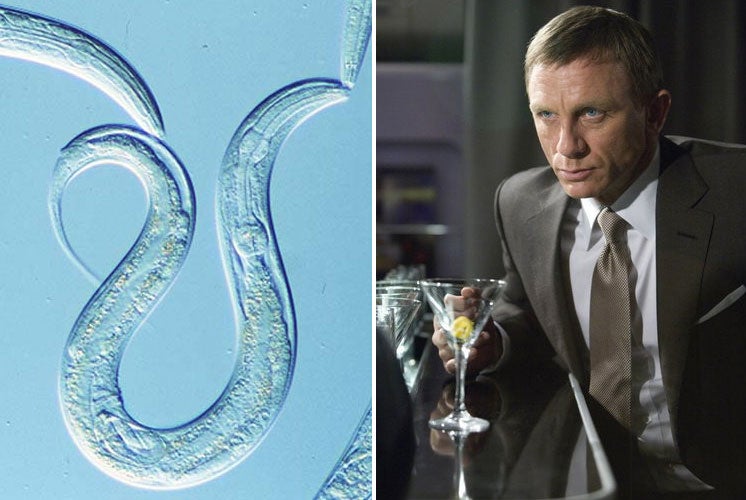Genetically engineered worms that can't get drunk could lead to a 'James Bond' sobriety pill
Although creating drugs to help alcoholics would be far more useful

Neuroscientists from the University of Texas have used genetic engineering to create worms incapable of getting drunk no matter how much alcohol they ingest.
The research, published in the Journal of Neuroscience this week, could be used to create drugs that treat the symptoms of alcohol withdrawal and perhaps one day block intoxication altogether in humans.
The key to the work stems from the scientists' modification of a “human alcohol target” that was implanted into a species of roundworm known as Caenorhabditis elegans. Human alcohol targets (of which there many) are molecular channels that bind alcohol in the body, triggering the whole spectrum of drunken behaviour.
For nematode worms (as for humans) this includes not being able to move as smoothly as when sober and giving up on procreation - two behavioural changes that make it easy for scientists to figure out when worms are drunk.
The researchers found that when creatures with the altered gene were dropped into petri dishes containing alcohol they simply did not display this behaviour – they just weren’t ‘getting drunk’.

"This is the first example of altering a human alcohol target to prevent intoxication in an animal," said research author Jon Pierce-Shimomura in a press release. "We got pretty lucky and found a way to make the channel insensitive to alcohol without affecting its normal function."
This last point is key as the molecular channel that the researchers modified (known as the BK channel SLO-1) also plays an important role elsewhere in the body, regulating the activity of neurons, blood vessels, the respiratory tract and the bladder.
Unlike other drugs such as cocaine, alcohol doesn’t have a single, specific target in the brain and instead hits a number of channels – a mechanism that causes the broad and complex effects of intoxication and alcohol addiction.
"Our findings provide exciting evidence that future pharmaceuticals might aim at this portion of the alcohol target to prevent problems in alcohol abuse disorders," says Pierce-Shimomura. "However, it remains to be seen which aspects of these disorders would benefit."
The researchers even speculated that one day they might be able to develop a “James Bond” drug that would enable spies to drink without becoming intoxicated - although its use outside of spycraft would be uncertain; if drinkers couldn't feel the effects of alcohol they might never stop.
Join our commenting forum
Join thought-provoking conversations, follow other Independent readers and see their replies
Comments
Bookmark popover
Removed from bookmarks